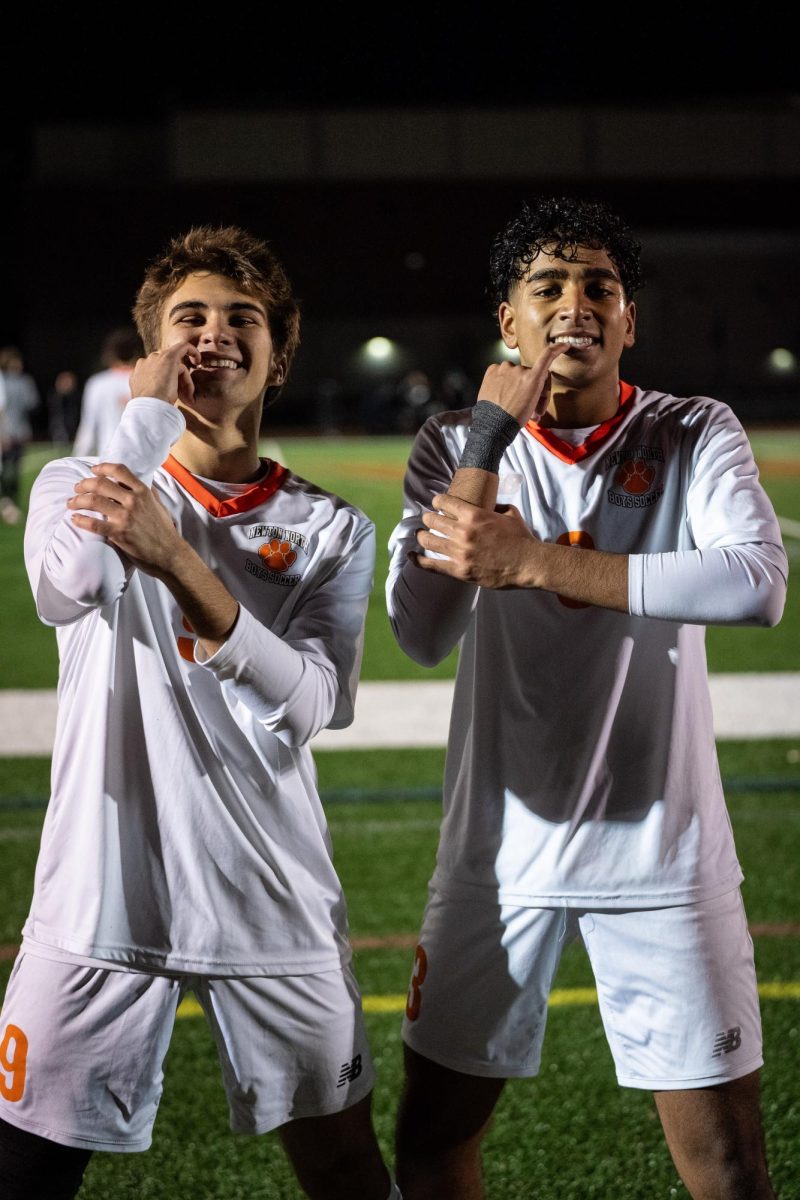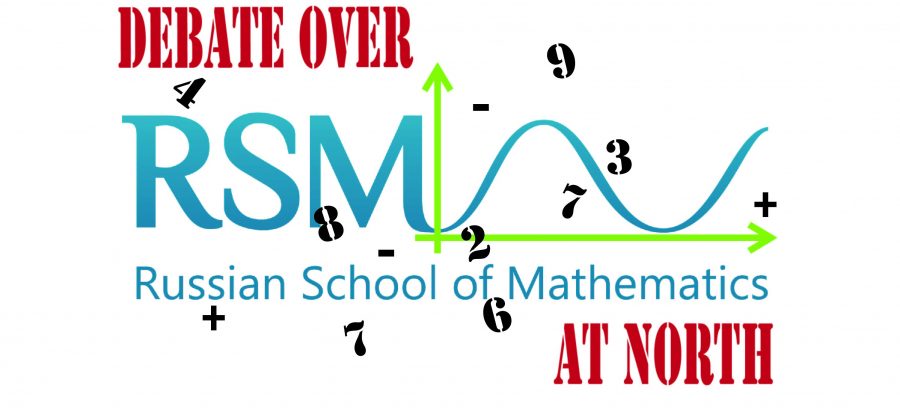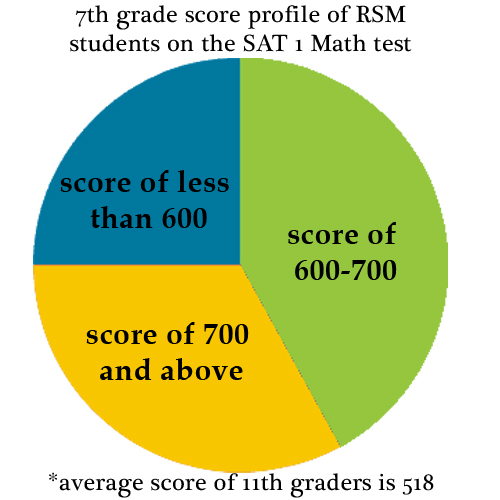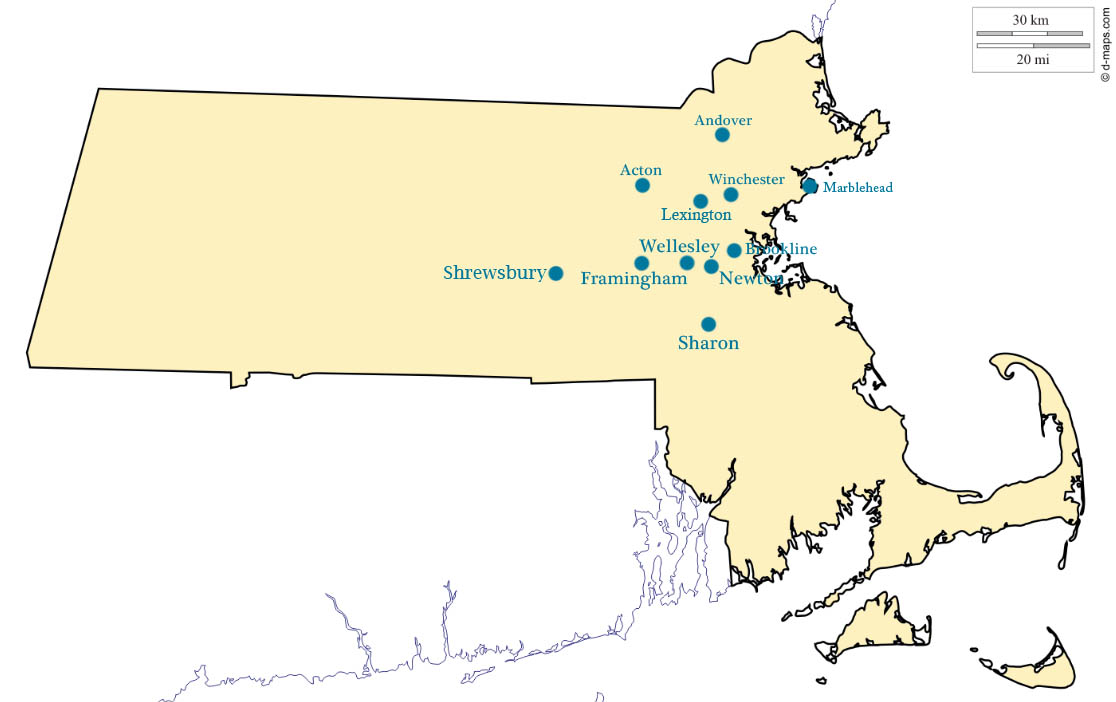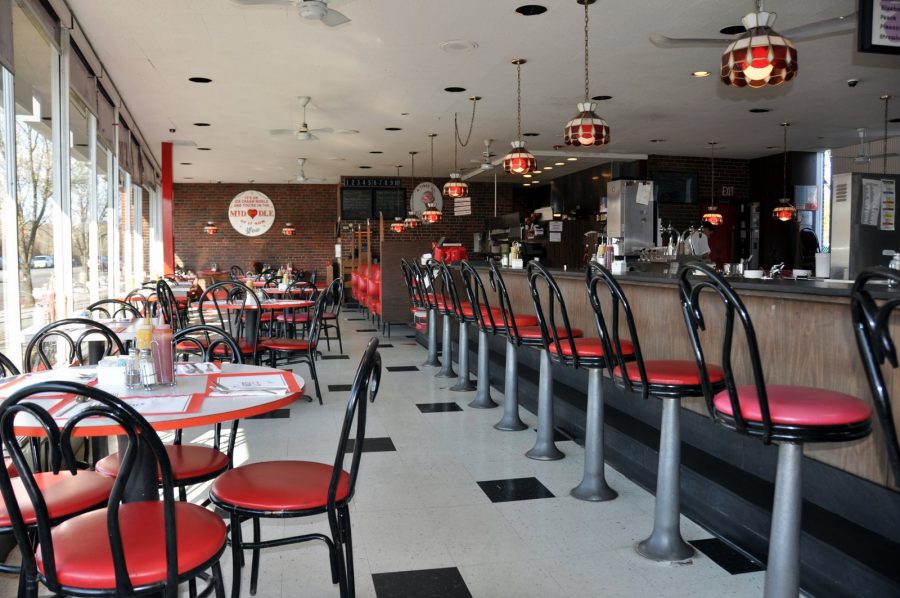First published Oct. 24, 2014.
by Emily Moss
On a Saturday afternoon, children of all ages file out the doors of a large building on Wells Avenue in Newton, their minds swimming with the new concepts and problems of the day and their arms overflowing with books and supplies as they rush to meet their parents.
This building, known as the Russian School of Mathematics (RSM), is home to a private math enrichment program that claims to engage over 2400 students in Newton (primarily in grades K-10) and teaches them advanced math concepts using Russian and European teaching techniques.
Many parents—including some who are unsatisfied with the math education their children receive in school—believe that enrollment in such programs will help their children succeed in higher-level math classes and a selective college market. Yet others argue that these programs are unnecessary, that they place lower income students at a disadvantage, or that they have a negative impact on the classroom dynamic in schools.
Ralitsa Dimitrova, the principal of RSM Newton, noted that one of the things RSM emphasizes is healthy competition and that although there are many “wonderful” teachers in the public schools, the public school curriculum often does not push students to reach their full potential in mathematics.
“The fact that the kids aren’t asked to do more limits their development,” said Dimitrova.
Two students who have attended RSM for parts of high school and who are enrolled in honors math at North, sophomore Ryan Steele and another student who asked to remain anonymous, say that their parents originally made the decision to enroll them at RSM in elementary school but that over time they grew to appreciate the benefits of the program. Both students say that their experiences at RSM have given them an advantage in school.
Steele said that the teaching style at RSM is very fast-paced and that this method has been beneficial to him but that the program is a “waste of time” for kids who have trouble keeping up with the material.
A student who wished to remain anonymous noted of RSM, “You get better at math, and you’re way ahead of everyone in regular math classes at school. You feel more confident about yourself in math.”
However, the anonymous student also described the “tough love” method used by the teachers at RSM, saying that she spent about two hours completing the 70 to 150 homework problems assigned each week when she attended RSM.
“The teachers are a bit insane, and you have to deal with them,” she said. “They’re really demanding, and it can be kind be of intimidating at first when they call on you and you don’t know the answer. But you get through it.”
Dimitrova noted that active class discussion is an important aspect of the RSM curriculum and teaching style. According to RSM’s website, the program aims to give students a “solid foundation in math and logical reasoning, self-confidence, and a love of learning,” and strives to help students of all ages “understand mathematical concepts at a very high level.”
RSM also claims to help students achieve an average math SAT score of 774 by their junior year, according to the program’s website, though Dimitrova noted that this high performance is a “byproduct” of the RSM curriculum and not the focus.
According to Steele, RSM teachers try to teach certain material that students do not learn in the Newton Public Schools until considerably later. For example, advanced-level RSM students begin learning geometry proofs during fifth grade, according to Steele, whereas many honors students at North have no experience with proofs prior to their freshman year.
“By the time I got here,” said Steele, “it seemed ridiculously easy to be starting proofs again because I’d already done it for four years.”
According to Dimitrova, introducing concepts such as geometry in the curriculum earlier on helps students understand and remember the concept better, as is usually the case in teaching a spoken language.
However, it is sometimes difficult to measure exactly how prior exposure to the curriculum impacts a student’s performance in school.
Although several faculty members declined to comment for this piece, math teacher Dennis Klem noted that RSM seems to cover “many math topics prior to when the North curriculum does” but that “it does not seem to delve into these topics with the same degree of depth as the North curriculum.”
He added, “I would not say that students who attend RSM are at an advantage in their North math classes. While the students may have seen aspects of different topics prior to their peers, it is still their responsibility to ensure that they pay special attention to those aspects that they have yet to explore, and master them.”
Math teacher Audrey Prager said that last year, she was aware of RSM students in her 501 classes. She noted that she has no “direct experience” with the program and cannot compare a public school that educates students in all areas to a private math enrichment program like RSM; however, she has made several observations about the relative performance of RSM students and non-RSM students in class.
Prager said that RSM students are generally familiar with a very large number of topics in math and that although some of these students are able to successfully explain what they have learned in school and at RSM, others may not yet have “mastered” the material.
“Thinking about specific students who told me they participated in the program, I can think of some that made wonderful contributions to our math classes here,” said Prager. “We also have a number of students who don’t take RSM that make wonderful contributions.” She added, “Students that take RSM probably run the gamut and include a variety of student ability levels.”
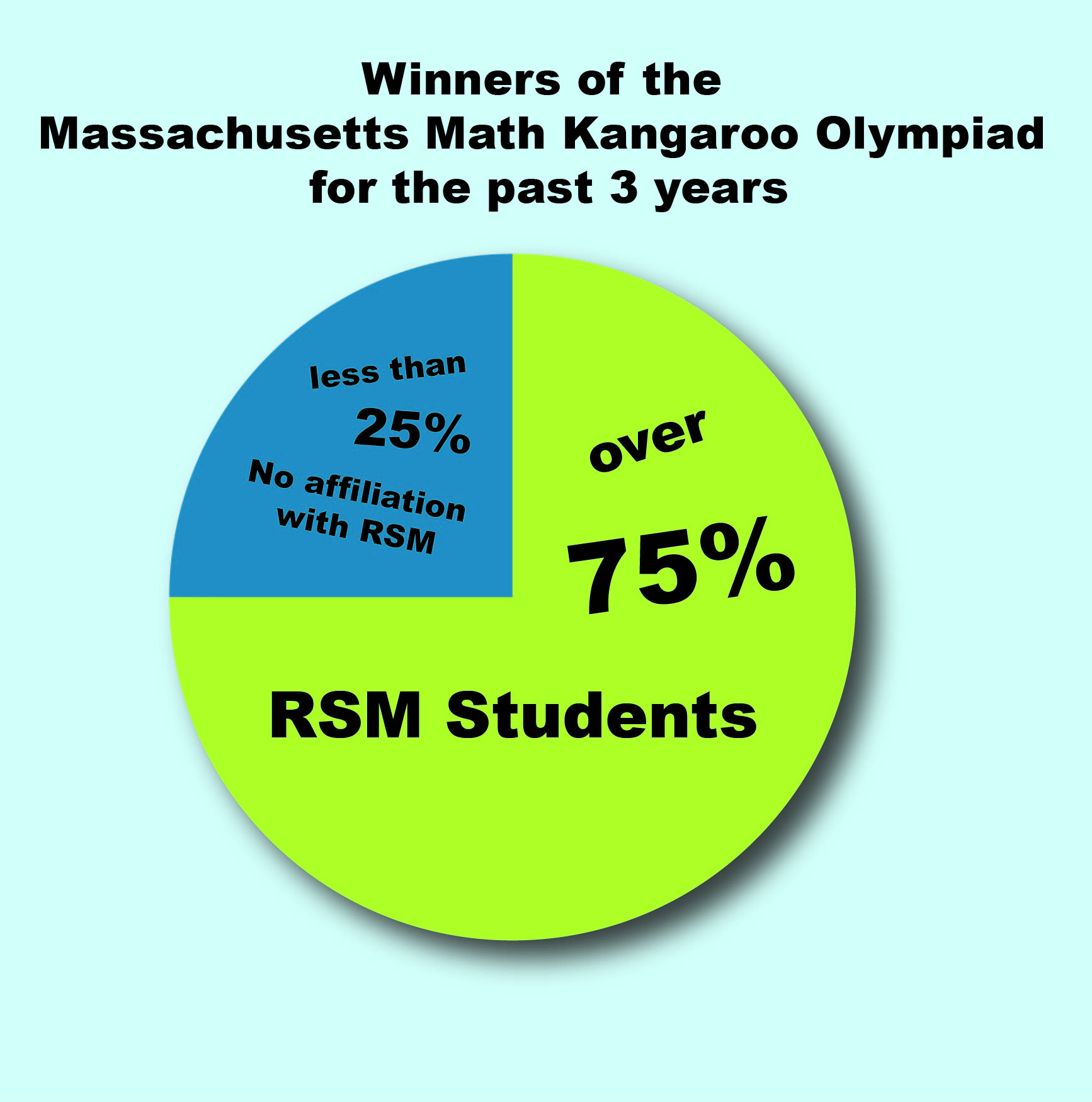
The majority of students to win prominent math awards in Massachusetts have enrolled at RSM. Graphic by Maria Trias.
Prager said that students who take ninth grade honors math—with or without RSM as a supplement—“appear to be well-prepared to take and succeed in a year of college calculus” by their senior year of high school.
“The first year student here may not ‘cover’ as much ground as students elsewhere, but so far it seems that the foundation laid has led to success in the four-year program here and beyond,” said Prager. She also noted that “student discovery, asking ‘why,’” and learning to explain and defend solutions both orally and in writing are all important aspects of the 501 curriculum.
Prager also said that as a teacher, she tries to create an atmosphere where students feel comfortable asking questions.
One issue that several people raised in connection with RSM is how the presence of RSM students—who have had prior exposure to key concepts—affects this atmosphere for non-RSM students.
Sophomore Emma Brown, who takes honors math but does not attend RSM, said, “When you haven’t been exposed to the curriculum, they have an advantage and you feel behind.”
“It’s a little frustrating just because it seems like everyone else is so much smarter than you,” said Brown, “but maybe if I’d taken Russian Math I’d be at that level too.”
One North parent who works as an English teacher and college counselor outside of this school but asked to remain anonymous said she believes that the presence of RSM students likely “does change the classroom dynamic” for students and teachers. This parent chose not to send her own children to RSM, though she noted that “there is a great deal of pressure in communities like Newton to do everything you can to help your children succeed.”
“The tricky thing is that if some people are doing a program like RSM, it is often hard for others not to do it for fear that their kids will be left behind,” she said.
In addition, the anonymous parent noted that students’ enrollment in academic enrichment programs can create new challenges for teachers in that teachers sometimes have little knowledge of which students do and do not attend these programs. The anonymous parent said that in her own classroom, it can be difficult to gauge whether a student’s progress is “the result of my instruction or from additional coaching or support.”
“Since I would like to teach as well as possible, having reliable information about what students are learning in the classroom is very important,” she said.
Klem, similarly, noted the importance of a teacher knowing “his or her students’ math backgrounds.”
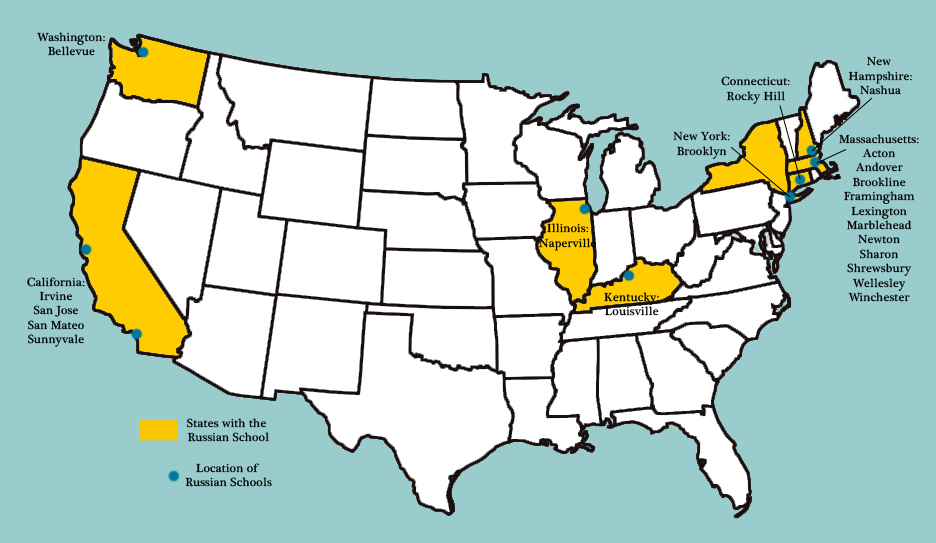
Russian Math Schools are located all across the country in high-performing suburbs. Graphic by Maria Trias.
“If the most vocal students pick up the main ideas of the concept quickly, this knowledge could give the teacher a false sense that the entire class understands the material (which may not be true),” said Klem. “Because RSM students have seen parts of concepts in advance, they may be able to jump beyond the introductory material quicker than their peers. Nevertheless, it is important that all students be equipped with the same foundation in order to move forward.”
Another North parent who works as an independent college counselor, Julie Amouyal, suggested that the presence of RSM students in school classrooms can have mixed effects on teachers and non-RSM students.
“My guess is that RSM kids potentially could have a positive influence on the class through pointing out alternative or quicker ways to approach math problems and through helping their peers inside and outside the classroom,” said Amouyal. “Another possibility, though, is that the RSM kids come across as bored or frustrated, which can be distracting and time consuming for teachers who want to keep all students engaged.”
Amouyal added that “If the kids are really all over the place” in terms of level, then “it’s hard for teachers” to maintain an appropriate pace.
For those who do enroll in RSM, there is a significant price tag—$2800 per year for high school students—although RSM does offer reduced tuition and even a few full scholarships based on family income, according to Dimitrova.
In addition, Dimitrova said that RSM opens new locations wherever there is the most demand—often in other suburbs with high-performing public school systems, such as Brookline, Lexington, Sharon, and Wellesley.
“It’s a little frustrating just because it seems like everyone else is so much smarter than you, but maybe if I’d taken Russian Math I’d be at that level, too,” said sophomore Emma Brown.
However, some people think that the already high quality of education in some suburban schools—including in Newton—actually reduces the need for private enrichment programs like RSM.
College counselor Brad MacGowan said, “I think that students have great opportunities at Newton North. I do not see why any additional classes are needed.” According to MacGowan, “We have a ‘world-class’ math department and a great, well-designed curriculum that engages students and helps them succeed.”
However, like the anonymous parent, he noted that “students and families should make their own decisions” regarding whether to enroll in private enrichment programs like RSM.
Dimitrova added that RSM does not intend to cause tension or competition with the public schools and that both institutions work with the goal of providing the best possible education to students.
“We are supplementary and are helping each other,” said Dimitrova. “We’re partners with the public schools. I hope more teachers will understand that we respect them.”













